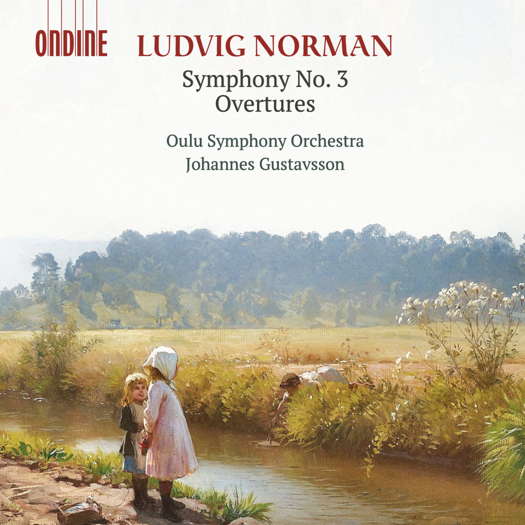 FEEDBACK: She said WHAT? Read what people think about our Classical Music Daily features, and have your say!
FEEDBACK: She said WHAT? Read what people think about our Classical Music Daily features, and have your say!
 DISCUSSION: What is a work? John Dante Prevedini leads a discussion about The performing artist as co-creator, including contributions from Halida Dinova, Yekaterina Lebedeva, Béla Hartmann, David Arditti and Stephen Francis Vasta.
DISCUSSION: What is a work? John Dante Prevedini leads a discussion about The performing artist as co-creator, including contributions from Halida Dinova, Yekaterina Lebedeva, Béla Hartmann, David Arditti and Stephen Francis Vasta.
- André de Ridder
- Oskar Sala
- Ronald Settle
- Giuseppe Pennisi
- People's Republic of China
- Franz Schmidt
- Ruggero Leoncavallo: Pagliacci
- Langgaard: Interdict

Exhilarating Performances
Orchestral music by Ludvig Norman, recommended with conviction by GERALD FENECH
'... rich in melody, colour and wide-ranging harmonies.'
Born in Stockholm, Ludvig Norman (1831-1885) grew up in humble circumstances due to his father's early death. He showed an exceptional musical talent at an early age, and with financial assistance from many influential persons, among them the famous soprano Jenny Lind, at the age of sixteen he went to study at the renowned Leipzig Conservatory. Returning to Stockholm as a professional musician and composer, he set out to raise the artistic level of musical life in his country.
Over the years he worked in many roles, but he was appreciated mostly as a conductor. Not yet thirty, he landed the post of chief conductor at the Royal Opera in Stockholm in 1861. He remained in the job for eighteen years where his work was highly praised for the level of performance that was at par with the best in Europe.
As a composer, Norman was not as successful. At the time folk music, opera and operetta were what the people wanted. But these did not appeal to Norman, who was more interested in chamber music, piano and orchestral works. Considered to be one of Sweden's main symphonists, Norman wrote three symphonies, three overtures and a funeral march in memory of August Söderman.
In 1864 Norman married Wilhelmina Neruda, a violin virtuoso of some fame, who hailed from Moravia. At first, the couple were very happy and they had two sons, but gradually their relationship turned sour. By 1869, a permanent breakup was inevitable. Being a Catholic, Wilma could not get a divorce, so they simply separated. Norman was devastated, and his enormous grief had a lasting impact on the last eighteen years of his life, a period of constant illness and depression.
Miraculously, all this suffering did not deter him from continuing with his creative activity. Indeed, three of the pieces on this recording date from this turbulent period. The Symphony No 3 in D minor, Op 58, was written in 1881, but not performed until 1885 after Norman's death. Here the tonal language is concentrated and the technique is refined.
Listen — Ludwig Norman: Allegro appassionato ma non troppo presto (Symphony No 3)
(ODE 1391-2 track 4, 0:02-0:53) ℗ 2022 Ondine Oy :
The opening is vigorous and succinct and this is followed by a delicate and slightly hesitant second subject. The following movement opens with a solemn melody, but this mood soon changes to a more mobile and temperamental one.
Listen — Ludwig Norman: Allegro appassionato ma non troppo presto (Symphony No 3)
(ODE 1391-2 track 5, 1:18-2:00) ℗ 2022 Ondine Oy :
The third is characterized by subtle motifs, pronounced rhythms and an elegant treatment of orchestral sounds. The symphony is brought to a close by a joyful and energetic concluding movement.
The Overture in E flat, Op 21, was composed in 1856 and first performed one year later. Here Norman, sticking to a traditional structure, combines formal elegance with contagious joy.
Listen — Ludwig Norman: Overture in E flat, Op 21
(ODE 1391-2 track 1, 6:22-7:22) ℗ 2022 Ondine Oy :
The Overture Antony and Cleopatra, Op 37, is a highly dramatic piece reflecting the passion and tragic end of the two lovers. It was composed for a first performance of Shakespeare's play on 28 March 1881.
Listen — Ludwig Norman: Overture to Shakespeare's Antony and Cleopatra
(ODE 1391-2 track 3, 0:01-1:00) ℗ 2022 Ondine Oy :
The Funeral March in B flat minor, Op 46, was written in 1876 in memory of August Söderman, Norman's colleague at the Royal Opera, who died at the early age of forty-three. This tripartite work is deeply expressive, sophisticated in sonority and harmonically evocative, besides being infused with a sincere heartfelt grief.
Listen — Ludwig Norman: To the Memory of August Söderman
(ODE 1391-2 track 2, 5:59-6:46) ℗ 2022 Ondine Oy :
Sadly, Ludvig Norman's music is still waiting to be discovered and explored. And why not? This issue reveals a composer full of energy and invention, and his writing is rich in melody, colour and wide-ranging harmonies. Johannes Gustavsson and his Oulu Symphony Orchestra players deliver exhilarating performances, and in their hands the music sounds even more exciting than one expects. Recommended with conviction.
Copyright © 27 August 2022
Gerald Fenech,
Gzira, Malta

CD INFORMATION - LUDVIG NORMAN: SYMPHONY NO 3; OVERTURES
CLASSICAL MUSIC ARTICLES ABOUT SWEDEN


